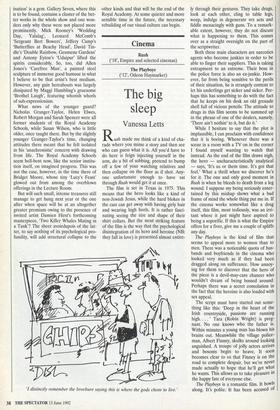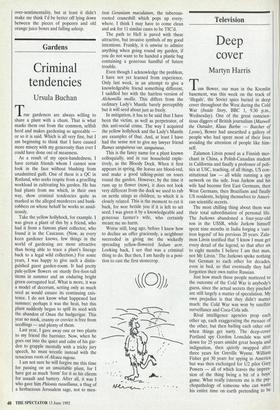Cinema
Rush ('18', Empire and selected cinemas) The Playboys ('12', Odeon Haymarket)
The big sleep
Vanessa Letts
Rush made me think of a kind of cha- rade where you mime a story and then see who can guess what it is. All you'd have to do here is feign injecting yourself in the arm, do a bit of sobbing, pretend to bump off a few of your watching relatives and then collapse on the floor as if shot. Any- one unfortunate enough to have sat through Rush would get it at once.
The film is set in Texas in 1975. This means that the hero looks like a kind of non-Jewish Jesus, while the hard blokes in the cast can get away with having girly hair and wearing high heels. It is rather fasci- nating seeing the size and shape of their shirt collars. But the most striking feature of the film is the way that the psychological disintegration of its hero and heroine (NB: they fall in love) is presented almost entire- ly through their gestures. They take drugs, look at each other, cling to table legs, weep, indulge in degenerate sex acts and fiddle menacingly with guns. To a remark- able extent, however, they do not discuss what is happening to them. This comes over as a straight oversight on the part of the scriptwriter.
Both these main characters are narcotics agents who become junkies in order to be able to finger their suppliers. This is taking entrapment to an extreme. Their boss in the police force is also an ex-junkie. How- ever, far from being sensitive to the perils of their situation, he is strangely content to let his underlings get sicker and sicker. Per- haps this has something to do with the fact that he keeps on his desk an old grenade shell full of vicious pencils. The attitude to drugs in this film seems to be summed up in the phrase of one of the dealers, namely, 'There ain't nothin' to it, but do it.'
While I hesitate to say that the plot is implausible, I can proclaim with confidence that it is boring. Whenever there was a scene in a room with a TV on in the corner I found myself wanting to watch that instead. As the end of the film draws nigh, the hero — uncharacteristically analytical — says, 'It's us or them time. It's got that feel.' What a thrill when we discover he's for it. The one and only good moment in Rush is when he bleeds to death from a leg wound. I suppose my being seriously enter- tained by this mishap shows what a bad frame of mind the whole thing put me in. If the cinema works somewhat like a drug itself, this film, most tediously, was an irri- tant where it just might have aspired to being a soporific. If this is what the Empire offers for a fiver, give me a couple of spliffs any day.
The Playboys is the kind of film that seems to appeal more to women than to men. There was a noticeable quota of hus- bands and boyfriends in the cinema who looked very much as if they had been dragged along on sufferance. How annoy- ing for them to discover that the hero of the piece is a devil-may-care chancer who wouldn't dream of being bossed around. Perhaps there was a secret consolation in the fact that the heroine is also loaded with sex appeal.
The script must have started out some- thing like this: 'Deep in the heart of the Irish countryside, passions are running high. . . . ' Tara (Robin Wright) is preg- nant. No one knows who the father is.
Within minutes a young man has blown his brains out. Meanwhile the village police- man, Albert Finney, skulks around looking anguished. A troupe of jolly actors arrives and bosoms begin to heave. It soon becomes clear to us that Finney is on the road to complete despair, but we're never made actually to hope that he'll get what he wants. This allows us to take pleasure in the happy fate of everyone else. The Playboys is a romantic film. It bowls along. It's polite. It has been accused of over-sentimentality, but at least it didn't make me think I'd be better off lying down between the pieces of popcorn and old orange juice boxes and falling asleep.



















































 Previous page
Previous page